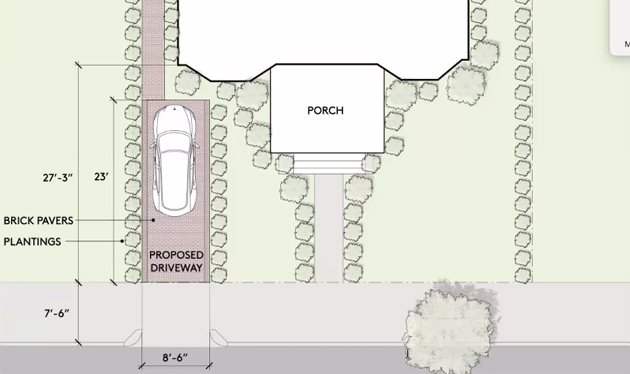
Diagram by RODE Architects.
Matthew Malloy of Ocean Street in Dorchester really, really wants to buy an electric vehicle. But he doesn't have a driveway and ISD has warned him that if he tries to run an extension cord over the sidewalk to a car parked at the curb, he'd get fined.
Malloy found relief today at a hearing of the Zoning Board of Appeal, which unanimously gave him permission to build a sort of mini-driveway up his front yard so he could pull in whichever EV he buys and plug it into the Level 2 charger he will also buy.
Malloy, CEO of the Dorchester Brewing Co., needed a variance because city zoning normally forbids parking spaces in front yards.
He said he tried to convince his neighbor to build a shared driveway - he even offered her the equivalent of $17,000 - but she just wasn't amped up about the idea and refused him. Driving 1.7 miles to the nearest public charging station, and then waiting in line to charge up wasn't practical, he said.
Shockingly, he said, Boston is not keeping current with some neighboring communities and has no answers for homeowners in a situation like his, even as City Hall is pushing for electrification of pretty much everything.
His plans, which called for a mini-driveway just large enough to pull his car in and plug it in, got no resistance from the local neighborhood association; in fact, it sent in a letter of support. Councilors Brian Worrell, Frank Baker, Erin Murphy and Michael Flaherty also supported the idea.
And, Malloy said, he's so committed to the idea of an electric vehicle, he would agree to remove the small driveway and curb cut if he ever went back to a gas vehicle.
The board approved his request for a variance unanimously - with a proviso the space only be used for an EV.
Board member Katie Whewell said she was very sympathetic. "It's something I'd think the city would want to encourage electric vehicles."
Malloy did not specify what sort of EV he's thinking about.
Like the job UHub is doing? Consider a contribution. Thanks!
Ad:

Comments
This will not be popular with
By Anon
Wed, 03/15/2023 - 12:38pm
This will not be popular with home owners with driveways but I firmly believe that you should have to pay rent for curb cuts in dense areas. A curb cut is essentially a private parking spot/s for the owner of the unit because nobody else can park in what could otherwise be a parking spot. In addition sometimes these curb cuts are so close to each other they leave bits of curb that are too small to park in. By charging for the cuts the city could use those resources to pay for sidewalk creation/repair, transit options and possibly even electric infrastructure brought right to the street.
I have nothing against this guy getting his curb cut but he is obviously ahead of the curb (curve yeah yeah I know) on this one. There will be more, many more. The fairness question will come into affect. Why does he get it but not me. Why do you get a cut because you happened to buy a house with one?
A cut is permanently handing over public property to a private entity. I do not see the harm in extracting value from that resource via property tax attachments and using the funds to support a more walkable, livable community for everyone.
I think you could make an
By NoMoreBanks
Wed, 03/15/2023 - 4:29pm
I think you could make an argument that a curb cut should be accounted for in tax valuations of a property. It does make your property more valuable, the same way a wider yard or whatever does.
Ultimately what would be better is if there were incentives and a legal structure to support land sharing in terms of curb cuts. This dude offered to support the costs of building a shared drive with his neighbor but that creates huge legal headaches, who owns what, whose responsibility is what, etc, etc, and a lot of people are going to be gun-shy about it. The city could try and catch these things at the building stage and ask developers to work together to cut down on cuts, sharing driveways, etc.
I would agree with that,
By Anon
Thu, 03/16/2023 - 9:00am
I would agree with that, maybe an automatic surcharge for curb cuts in land value that could be removed if you decide to cede it back to the city later.
I also like the idea of requiring new construction to coordinate. There are already laws around easements and shared access. I have seen so many homes that literally are only accessible through easement. All those former back yard lots that became homes come to mind. Many properties already share driveways by virtue of it always being that way. So I am sure they could take the laws around those and adapt it for more modern times.
I grew up in a house that had a shared easement between us and our neighbors, a small condo complex. Every so often they would get a new owner who would join the board and think we were parked on their property and would make threats to get us to stop using our land. My father would try to explain it to them but they would get upset and storm away. Ultimately they would finally end up at the city where it was explained to them that in fact 75 percent of that driveway belonged to my family and that they were technically on our land. My parents had agreed to grant an easement in exchange for their doing upkeep and matinece. of the space, some improvements on that side of our house and landscaping etc. Our parking was deeded to us because part of our car was on their land where as they just used our land to access their lot in the back. My parents still contributed to snow removal even though that was not required in the spirit of being good neighbors but they did not contribute to the HOA dues, which is what would set off the occasional new owner until they figured out my father had all the legal documents and that things only existed because we played nice twenty years earlier.
Other side of that coin
By HenryAlan 2.0
Thu, 03/16/2023 - 10:16am
A property owner might be able to argue that a curb constitutes an uncompensated taking, in the sense that it prevents access to the property from the public realm. Not sure how any of this works out in court, but it may well be that the competing interests offset one another.
Personally, I'd like to see all public use of the street for storage or access to private property be monetized. If my neighbor can park for free on public property in front of her house, why should I pay to park to park my car on private property in my drive way? My response is that we should both pay.
The idea is not that you're
By NoMoreBanks
Thu, 03/16/2023 - 11:06am
The idea is not that you're paying to park your car on your property. It's that you're paying to essentially reserve the parking-spot sized chunk of sidewalk in front of your house for your exclusive use by converting it to a curb cut. If the curb cut wasn't there, that area would be a parking spot for general use by the general public and therefore arguably some kind of common good. Because nobody can park there now (since otherwise you wouldn't be able to get in-out of your driveway) it's now an only-you good.
That said, the fact all street parking in this city is free is insane. The city should charge some kind of nominal fee to at least cover the cost of administering the parking permits, AT MINIMUM. Somerville's system is really good - a reasonable yearly fee, plus extra fees if you want a limited use visitor pass.
I would argue that while both
By Anon
Fri, 03/17/2023 - 11:59am
I would argue that while both should pay , the person with the driveway should pay more because that is essentially a guaranteed spot. The curb cut makes it impossible for anyone else to park in it.
I could see how one could argue that it restricts access but it is not required access. Many homes are situated in areas that do not have curb cuts and they manage just fine.
Pages
Add comment